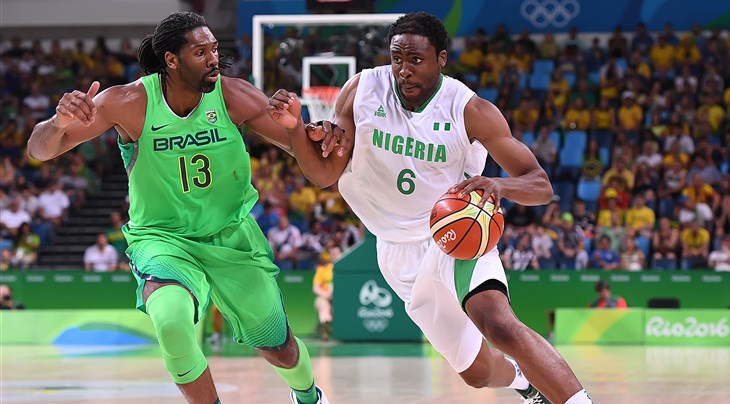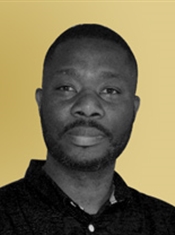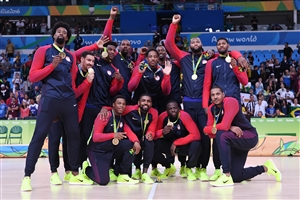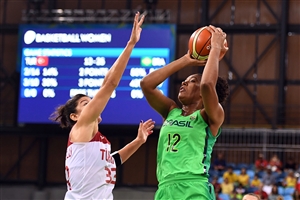
What went wrong with Nigeria in Rio?
SHEFFIELD (Julio Chitunda's African Message) - Nigeria headed to the Rio Olympics looking to change the course of history for African teams in the competition, but somehow they returned home with a sense of disappointment.
No African team has ever advanced to the Quarter-Finals at an Olympics, and the reigning Africans champions felt they had the talent and skill set to turn things around.
They competed hard, played attractive basketball at times, stunned a European giant and gained admiration from fans and opponents alike. But the reality of African teams in the Olympics remained unchanged.
Just like they did at the London Games four years ago, Nigeria won only one of their five group games.
So Angola (1992), the Central African Republic (1988) and Egypt (1948) remain the only African teams to win at least two games in an Olympics.
Like most Nigeria players I spoke to in Rio, I too felt they belong among the highly-competitive Olympics teams, and it came as no surprise that they rank as the No.1 team on the African continent.
Nigeria is officially the N.1 team in Africa's men basketball @NigeriaBasket @TeamNigeria10 https://t.co/yqGx84tX18 pic.twitter.com/vkhA1L7QTG
— Júlio Chitunda (@JChitunda) August 25, 2016
However, no matter how talented a team and/or player can be, playing in the Olympics requires a lot more than just that. It requires discipline, organisation, commitment and above all, concentration. One bad game can compromise a team's entire campaign if they are not mentally prepared to face adversity. And the Nigerians have faced never-ending adversities.
Over the course of the past few days, I have been asked countless times "What went wrong with Nigeria in Rio?"
Shane Lawal injured his left knee in Nigeria's opener against Argentina
Without having to mention the absence of Al-Farouq Aminu - a key player in Nigeria's recent success - through insurance issues, it all started terribly wrong for the Western Africans when they lost Shane Lawal through an injury that sidelined him for the rest of the competition.
Nuevo palo para Nigeria: Shane Lawal será baja para el resto de los Juegos de #Rio2016 https://t.co/qHqOtJahrx pic.twitter.com/eCKm10Iq1X
— MARCA Baloncesto (@MarcaBasket) August 9, 2016
A poor third quarter against Lithuania, which resulted in Nigeria's second straight defeat, left the Western Africans in danger ahead of their match-up against eventual bronze medalists Spain.
Rio 2016: Nigeria basketball team win against Croatia to ke... https://t.co/V5O9Z7a9H0 | https://t.co/JEEeFwIraI pic.twitter.com/4dqzCyd37G
— Naija What's Up? (@Naijawhatsup) August 15, 2016
By the time Nigeria faced and beat Croatia, they had their backs against the wall because they had to beat tournament hosts Brazil, who were also facing elimination.
Things didn't work out well for Nigeria.
It was about time to ask the players as well as the coaching staff to explain why they failed to reach their pre-established goal of becoming the first African teams to advance to the Quarter-Finals.
Here are some extracts of what they told me.
Oguchi's 7 three-pointers against Spain left everyone talking about the AfroBasket 2015 MVP
Chamberlain Oguchi
"It hurts [not to move on to the Final Phase]. Just the same way it hurt in 2012, but we showed a lot of promise and I am looking forward to what the future holds.
"We did a good job of showing the world that we belong here. We battled very hard... Spain, Lithuania… We knew it was gonna be a tough group coming in, and I think we did our best to compete and we showed we belong here."
Playing for Nigeria for the first time since 2009 for the D'Tigers, Akognon proved a crucial piece at the guard position
Josh Akognon
"We had a lot of different lapses mentally at times of the game that we cannot have. We had to always have the energy all the time and there were certain games where we were losing our energy and we can't afford to do that. For us, I think it was concentration when we had the games close. We were up against Lithuania and up one against Spain. We had to come together and we had to be stronger. We let those games slip out of our hands.
"It's very disappointing that we couldn't get to the medal round but at the same time this is a big step forward for the country. And we showed that we can be competitive, playing against the best teams in the world. We showed everybody that we can win, not just compete."

Will Voigt (left) left Nigeria to their first African title. His future as head coach of Nigeria yet to be decided by the Federation
Head coach Will Voigt
"Today [against Brazil], we didn't shoot the ball as well as we normally do, we didn't rebound as we normally do. Our legs were tired. A lot of our starters seem to have heavy legs, obviously, from playing a big role against Croatia. For whatever reason, we run out of steam.
"I don’t think we need anything special, we just need the bare necessities. Guys need to be fed… Guys need to know what the training schedule is.. Guys need to have insurance… Our top players will participate… I just think if we get the basic level of support, it’s gonna mean a lot moving forward.
"My heart and soul are with those guys in that locker room, but those decisions [his future in charge of Nigeria's national team] are made by the federation. I was here [in Rio] without a contract because there is no money from the government. I have shown my desire to do everything I can to support Nigerian basketball. We'll see what the federation decides."
It remains to be seen, next year, how this Nigerian team reacts at FIBA AfroBasket 2017 in Brazzaville, Republic of Congo.
Julio Chitunda
FIBA
FIBA's columnists write on a wide range of topics relating to basketball that are of interest to them. The opinions they express are their own and in no way reflect those of FIBA.
FIBA takes no responsibility and gives no guarantees, warranties or representations, implied or otherwise, for the content or accuracy of the content and opinion expressed in the above article.

















